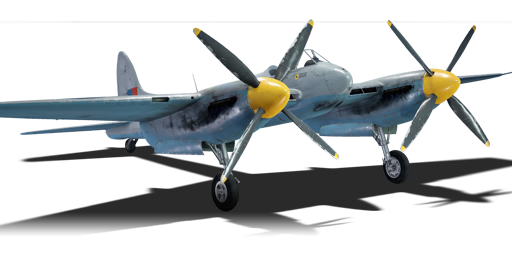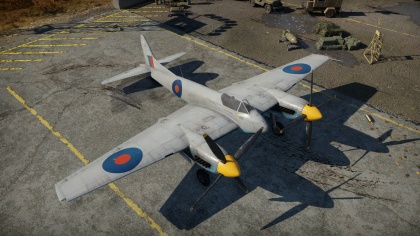Hornet Mk.III
Contents
Description
The Hornet Mk.III is a Rank IV British strike fighter
with a battle rating of 5.3 (AB), 6.0 (RB), and 5.7 (SB). This aircraft was introduced in Update 1.71 "New E.R.A".
General info
Flight Performance
Describe how the aircraft behaves in the air. Speed, manoeuvrability, acceleration and allowable loads - these are the most important characteristics of the vehicle.
| Characteristics | |||||||
|---|---|---|---|---|---|---|---|
| Stock | |||||||
| Max Speed (km/h at 5,791 m) |
Max altitude (meters) |
Turn time (seconds) |
Rate of climb (meters/second) |
Take-off run (meters) | |||
| AB | RB | AB | RB | AB | RB | ||
| 716 | 698 | 11500 | 26.8 | 27.5 | 19.2 | 19.2 | 500 |
| Upgraded | |||||||
| Max Speed (km/h at 5,791 m) |
Max altitude (meters) | Turn time (seconds) | Rate of climb (meters/second) |
Take-off run (meters) | |||
| AB | RB | AB | RB | AB | RB | ||
| ? | ? | 11500 | ??.? | ??.? | ??.? | ??.? | 500 |
Details
| Features | ||||
|---|---|---|---|---|
| Combat flap | Take-off flap | Landing flap | Air brakes | Arrestor gear |
| ✓ | ✓ | ✓ | X | X |
| Limits | ||||
|---|---|---|---|---|
| Wing-break speed (km/h) |
Gear limit (km/h) |
Combat flap (km/h) |
Max Static G | |
| + | - | |||
| 0 | 324 | ??? | ~?? | ~? |
| Optimal velocities | |||
|---|---|---|---|
| Ailerons (km/h) |
Rudder (km/h) |
Elevators (km/h) |
Radiator (km/h) |
| < ??? | < ??? | < ??? | > ??? |
| Compressor (RB/SB) | ||
|---|---|---|
| Setting 1 | ||
| Optimal altitude | 100% Engine power | WEP Engine power |
| 2,000 m | ??? hp | ?,??? hp |
| Setting 2 | ||
| Optimal altitude | 100% Engine power | WEP Engine power |
| 4,300 m | ?,??? hp | ?,??? hp |
Survivability and armour
- 38 mm Bulletproof glass in front of pilot.
- 12.7 mm Steel plate behind the pilot.
- Two 3 mm Steel boxes behind pilot in the fuselage.
- Critical components located at the front of aircraft (fuel, pilot, engine, controls)
- Lots of fuel tanks in the wings
Armaments
Offensive armament
The Hornet Mk.III is armed with:
- 4 x 20 mm Hispano Mk.V cannon, chin-mounted (190 RPG = 760 total)
Suspended armament
The Hornet Mk.III can be outfitted with the following ordinance"
- Without load
- 2 x 500 lb bombs
- 2 x M.C. 1000 lb Mk.I bombs
- 8 x AP Mk I rockets
- 8 x AP Mk II rockets
- 8 x RP-3 rockets
- 4 x AP Mk I rockets + 2 x 500 lb bombs
- 4 x AP Mk II rockets + 2 x 500 lb bombs
- 4 x RP-3 rockets + 2 x 500 lb bombs
- 4 x RP-3 rockets + 2 x M.C. 1000 lb Mk.I bombs
- 4 x AP Mk I rockets + 2 x M.C. 1000 lb Mk.I bombs
- 4 x AP Mk II rockets + 2 x M.C. 1000 lb Mk.I bombs
- 4 x RP-3 rockets + 2 x M.C. 1000 lb Mk.I bombs
Usage in battles
Manual Engine Control
| MEC elements | ||||||
|---|---|---|---|---|---|---|
| Mixer | Pitch | Radiator | Supercharger | Turbocharger | ||
| Oil | Water | Type | ||||
| Controllable | Controllable | Not controllable | Controllable | Combined | Controllable | Controllable |
Modules
| Tier | Flight performance | Survivability | Weaponry | |||
|---|---|---|---|---|---|---|
| I | Fuselage repair | Radiator | Offensive 20 mm | HMBC mk.2 | ||
| II | Compressor | Airframe | New 20 mm cannons | GRC mk.8 | ||
| III | Wings repair | Engine | HLBC mk.2 | HRC mk.9 | ||
| IV | Engine Injection | Cover | HRC mk.8 | |||
Pros and cons
Pros:
- Excellent armament. The Hispano Mk. V has a high rate of fire and causes a lot of fragmentation damage.
- Fast. Can compete with some early bombers.
- Has some excellent payload options. Several varieties of rockets and up to 2000 lb in bombs.
- Good amount of ammo for the cannons
- Quite maneuverable for a twin engined fighter
Cons:
- Not great at killing heavy bombers like the He 177 which shares your BR. You are not durable enough to take hits from defensive gunners. You will lose an engine or worse.
- Matchmaking will pit you against some serious foes.
History
The de Havilland first started out as a private venture by the de Havilland company. Having built the extremely successful Mosquito multi-role fighter, the company wants to improve on the design to make a faster and longer ranged heavy fighter. The project was soon developed to meet the Air Ministry specification F.12/43, which called for a fast, long-range fighter that operated in the Far East, in fact the design was drawn around the Hornet. The first prototype was a more streamlined, smaller Mosquito with more powerful Rolls-Royce Merlin engines. The wings were designed for adaptation for naval uses and could fold. Pilot comfort and stability had very high priority. According to accounts by test pilots, the Hornet is easily capable of taking on single engine fighters. It entered Squadron service in mid-1946. However it was rarely used as World War Two was drawing to a close. Instead the plane saw combat operations during the Malayan Emergency, and continued to serve the RAF until 1956.
Media
Excellent additions to the article would be video guides, screenshots from the game, and photos.
See also
Links to the articles on the War Thunder Wiki that you think will be useful for the reader, for example:
- reference to the series of the aircraft;
- links to approximate analogues of other nations and research trees.
External links
Paste links to sources and external resources, such as:
- topic on the official game forum;
- encyclopedia page on the aircraft;
- other literature.
| Britain strike aircraft | |
|---|---|
| Blackburn | Firebrand TF Mk IV · Firecrest |
| Bristol | Beaufighter Mk I (40-mm) · Beaufighter Mk VIc · Beaufighter Mk X · Beaufighter Mk 21 |
| CAC | ▄Wirraway |
| Fairey | Firefly F Mk I · Firefly FR Mk V |
| de Havilland | Mosquito FB Mk VI · Mosquito FB Mk XVIII |
| Hawker | Hurricane Mk IV · Tempest Mk V (Vickers P) |
| Westland | Wyvern S4 |





